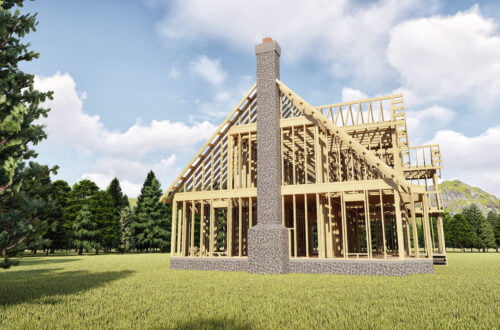What Happens During an Appraisal of a Property
Real estate appraisal helps determine the true worth of a property. Appraisals involve an in-depth inspection of the structure, researching local market trends, and other considerations to help make an accurate assessment of its value. Knowing how to navigate an appraisal can be an invaluable tool when selling or buying a home.

What is an Appraisal of a Property
If you’re planning to buy or sell a property, then you’ve likely heard the term “appraisal of a property” thrown around. But what does it actually mean? In simple terms, an appraisal is an estimate of the value of a property conducted by a certified professional. The goal is to provide an unbiased opinion on how much the property is worth in the current market.
Appraisals are important for several reasons. For one, they help buyers understand whether or not they are paying a fair price for a property. This can also be helpful when negotiating with sellers. Additionally, appraisals are often required by lenders before approving a mortgage loan. In this case, the lender wants to ensure that they are not lending more money than what the property is worth.
When it comes down to it, getting an appraisal of a property can save you time and money in the long run.
Conducting an Appraisal of a Property
When it comes to buying or selling a property, an appraisal is crucial. An appraisal of a property helps determine its value in the current market conditions. It’s like getting a report card for the house! The appraisal process involves assessing various aspects of the property, including its location, size, condition, and amenities.
Gather Information and Conduct Property Inspection
Before the actual appraisal begins, the appraiser collects historical data about the property and its surrounding area. They typically inspect both the exterior and interior of the structure to assess condition, location, features, square footage, and quality of construction. An appraiser may also take pictures to better document the property’s condition. This information helps them determine a realistic estimate of market value.
During the appraisal process, appraisers assess nearby land sales and compare the current property’s attributes to properties with similar characteristics in the area. This helps them determine how much a buyer would be willing to pay for the home. The appraiser also makes adjustments for any other factors that could increase or decrease market value including architectural features, zonings, and amenities. Finally, they use all this gathered information to determine an estimated market value of the home that can be used by mortgage lenders and potential buyers.
Research Data and Market Trends
The appraiser will then research current market trends that affect the value of the property. This includes analyzing past and present sales prices, measuring economic indicators like employment and population growth, researching nearby comparable homes, and assessing rental trends in the area. All this data can help determine what a reasonable market price would be for a property of similar qualities in its current condition.
Furthermore, the appraiser will consider a variety of external factors such as taxes, energy efficiency, geography, and age of the property when evaluating its worth. They may also take into account any repairs or remodeling that may have been done to the property. This information allows the appraiser to compare selling prices in the area with other properties and determine a fair market value for the subject property. Ultimately, this helps determine an accurate appraisal report for a reliable estimate of fair market value of the property.
Consider Ecological Impact of Property
The appraiser will also consider the ecological impact of the property. This may include things like flood risk, trees and vegetation, sloping land or hillsides, nearby bodies of water, underground oil tanks or natural gas pipelines, asbestos in the structure, environmental protection efforts and more. These issues may need to be addressed before a true value for the property can be determined.
While not directly related to the property’s market value, there are many ecological factors that can affect the value of a property. For example, if there is significant flooding risk due to nearby bodies of water, this may lower the property’s value. Likewise, a large number of trees or vegetation may indicate that additional landscaping costs may be necessary before a sale can take place. An appraiser will take all these factors into consideration to ensure an accurate assessment of the home’s worth.
Determine Value Based on Market Comparables
As part of the appraisal process, a professional appraiser will compile a detailed report using market comparables. This involves researching recent sales prices of similar properties in the same area, adjusting for variables such as condition and amenities to accurately determine the value of the property in question.
The process of comparing market comparables involves putting together information from a variety of sources, including tax records, home sale listings and current pricing trends. Appraisers may also use data to evaluate potential changes in the local market based on construction activity, population demographics or economic indicators. When reviewing these variances, an appraiser needs to consider how they could impact the value of a property being evaluated. Ultimately, this helps ensure that an accurate value is determined when carrying out a property appraisal.
Report Findings to Homeowner, Lender, or Realtor
After the appraiser’s inspection and market research has been completed, the findings will need to be reported back to the homeowner, lender, or realtor. The appraisal report can range in length and detail but the most important section is the appraised value – which needs to be accurate and reliable enough to be used as part of any property transaction. A copy of the report should also be provided so that it is readily available for review by all parties involved.
Providing an accurate appraisal report is essential in order to ensure that all parties involved understand the value of a property and can make the best decision regarding any sort of real estate transaction. The report should be clearly written in easy-to-understand language, without any unnecessary jargon or technical terms, and should include basic details such as market analysis, condition and quality of repairs, neighborhood evaluation, condition of improvements, and appraiser’s opinion of correct value. An additional reference should be included along with a copy of the examination ensuring that each recipient has total access to the information needed in order to make a well-educated decision.
Reasons for an Appraisal of a Property
If you’re planning to buy or sell a property, getting an appraisal of the property is crucial. Why? Because it helps you determine the true value of your investment. Whether you’re a buyer or a seller, here are some reasons why an appraisal of a property is important.
First and foremost, an appraisal ensures that the price of the property is not exaggerated or undervalued. A qualified appraiser will evaluate all aspects of the property such as its location, size, condition and recent sales in the area to determine its true market value. This information is then used by buyers and sellers to make informed decisions about their investments.
Secondly, lenders require an appraisal before they can approve a mortgage loan for buyers. The lender needs assurance that they are lending money on a property that has enough value to cover their investment in case things go south.
Finally, insurance companies use appraisals to determine the amount of coverage they need to issue on a property. When insuring a home, lenders and insurance companies want proof of its value.
Who Does the Appraisal of a Property
So, you’re buying or selling a property and you’ve heard the term “appraisal” thrown around. But who exactly does the appraisal of a property? Well, it’s not just any random person – it’s a highly trained professional called an appraiser.
Appraisers are typically licensed or certified by their state to conduct property appraisals. They use their expertise and knowledge of the real estate market to determine the fair market value of a property based on various factors such as location, condition, size, and comparable sales in the area.
It’s important to note that while lenders require an appraisal before approving a mortgage loan, appraisers work independently from both buyers and sellers to ensure an unbiased valuation. So next time someone asks you who does the appraisal of a property, you can confidently tell them it’s in the hands of a qualified appraiser!
Types of Appraisals
Not all appraisals are created equal – there are different types that may be used depending on your situation.
Comparison Approach
The comparison approach is a method of appraising a property by comparing it to similar properties in the same area. This allows for a more accurate valuation than simply relying on the market value of the property alone. By taking into account factors such as location, size, and condition, an appraiser can give a much more realistic appraisal of your property.
So why is this important? Well, if you’re selling your home, knowing its true value can help you set an appropriate asking price that will attract buyers without leaving money on the table.
Income Approach
The Income Approach involves evaluating the potential income that can be generated from a property. This method is usually used for commercial properties like office buildings, hotels, and apartments. The basic idea behind this approach is that the value of a property depends on how much money it can make in the future.
To calculate the value using this method, appraisers first estimate the potential rental income that can be generated from the property. Then they deduct all the expenses associated with running and maintaining that property like maintenance costs, taxes, insurance, etc. After subtracting these expenses from rental income they get net operating income (NOI).
Cost Approach
The cost approach is one of three commonly used methods for determining the value of a property. It is based on the idea that a buyer should not pay more for a property than it would cost to build an equivalent one. This approach calculates the estimated cost to replace or reproduce an existing structure, minus any depreciation, plus land value.
The process begins with estimating the current value of all improvements made to the property, including buildings and other structures. Then, factors like wear and tear are taken into account in order to determine depreciation. After this, costs associated with constructing similar buildings are calculated and added together. Finally, land value is added to this total sum in order to arrive at an estimate of overall worth.
Costs & Timing of an Appraisal of a Property
If you’re in the market for a property appraisal, you might be wondering what kind of costs and timing are involved. It’s not exactly cheap or fast!
First off, let’s talk about the cost. A property appraisal can range anywhere from a few hundred bucks to over a thousand dollars depending on a few factors. The size of your property, type of property (residential vs commercial), and location can all play a role in determining the cost. It’s important to do your research and get quotes from multiple appraisers before committing to one so you can ensure you’re getting the best deal possible.
Now let’s chat about timing. Unfortunately, an appraisal isn’t something that can be done overnight. It takes time to perform all of the necessary research, take measurements, and then write up a report. The turnaround time for an appraisal can range from 5-10 business days to even a couple of weeks.
Finding a Reputable Appraiser
When it comes to selling or buying a property, it’s essential to get an accurate appraisal. However, finding a reputable appraiser can be tricky. You don’t want to end up with an overvalued or undervalued property that could cost you both time and money in the long run.
To start your search for a reputable appraiser, reach out to friends and family members who have recently bought or sold properties. They may be able to recommend an appraiser they trust. Another option is to check with real estate agents in your area as they often work closely with appraisers and can provide recommendations based on previous experiences.
Once you have some options, make sure the appraisers are licensed and certified by checking their credentials online. It’s also important to ask about their experience in the industry and whether they specialize in certain types of properties such as commercial or residential.
Final Thoughts on an Appraisal of a Property
When it comes to the appraisal of a property, there are some final thoughts that you should keep in mind. First and foremost, it’s important to remember that an appraisal is not the same as a home inspection. While an appraisal will provide you with an estimate of your property’s value, a home inspection will give you a more detailed understanding of the condition of your property.
Another thing to keep in mind when getting an appraisal is that it’s important to work with a qualified appraiser. Make sure that the person conducting your appraisal is licensed and experienced in the type of property you’re looking to have appraised. You don’t want to rely on someone who doesn’t have the expertise necessary to provide accurate results.
Finally, remember that an appraisal is just one piece of information about your property. Use it to get a sense of the overall value of your home and how it stacks up against other homes in the area. Is it too high or too low? Use this information to help you decide what your property is worth based on both its physical condition and location.







One Comment
Pingback: